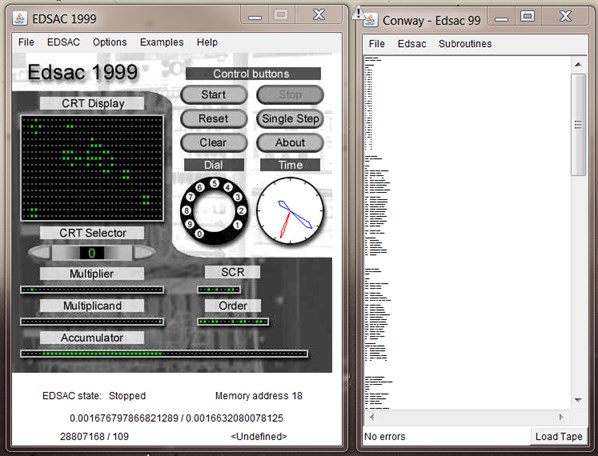Cambridge's First Computer
It was great to hear the news today that work has started on rebuilding the EDSAC at Bletchley Park.
Many regard the EDSAC as the first computer because it was the first machine to store its instructions in electronic memory. This is only one definition, as Babbage, Turing or those chaps at Manchester University who built an electronic calculator would argue that they also had made a computer. What is undisputed is that the EDSAC was Cambridge's first computer, established the first computer science department and course, and is a very important milestone in British computing.
The news made me remember my time as an undergraduate in the Computer Lab at Cambridge. Thanks to a quirk of timing I was a student at the time of the 50th anniversary of the EDSAC in 1999. For our group project – an early foray into project management – we were tasked with building a simulator of the original EDSAC as a web application, to be demonstrated at an EDSAC anniversary conference.
Sorry to interrupt…
If you like what you've read so far, join us on LinkedIn to talk all things digital product development with our team of experts.
This meant the unique opportunity to meet with Sir Maurice Wilkes, who was still at large within the department, and various other luminaries whose importance sadly I didn't really appreciate at the time.
Our EDSAC emulator is still available on the web – including some of the rudimentary games and demonstration code we wrote to use it. Unfortunately, our project web page used some overly complex navigation which doesn't play nicely with modern browsers – we've had to learn our lessons the hard way on coding standards here. However, the good news is that the Java Applet does still work on modern browsers:

Click here to launch the EDSAC 99 simulator (hosted at the University of Cambridge Computer Laboratory website).
To compensate for the lack of working menus on the original project site, you can access the contemporary documentation using these links:
Simulator:
Technical:
- Writing programs for the EDSAC 99
- The instruction format for EDSAC assembler
- Information about EDSAC 99 assembler, an extension to the original
Background:
- A (very short) history of EDSAC
- Information about the architecture of EDSAC – based on an original interview with Sir Maurice Wilkes
- The project team
Our project was selected as the winning group in the year, presumably largely due to the high profile nature of the delivery. In hindsight, it was quite a privilege to be a part of it.
Where are they now?
- Alan Mitchell – writing this web page, on his own company's blog
- Colin Watson – still in Cambridge, coding Ubuntu for Cannoncial, homepage found here
- Joe Marshall – doing a very interesting sounding PhD at Nottingham University, homepage
- Matthew Wakeling – last heard of coding for dept of Genetics, Cambridge University
- Dominic Penfold – Working for IG group, according to his LinkedIn page
- Chris Town – Director of Studies at Wolfson College
- James Slorach – Missing from the web. Apart from his undergrad pages.
Ready to solve your problems?
We'll help meet the challenges facing your growing business. Get in touch and tell us what you need, the team can't wait to hear from you.


